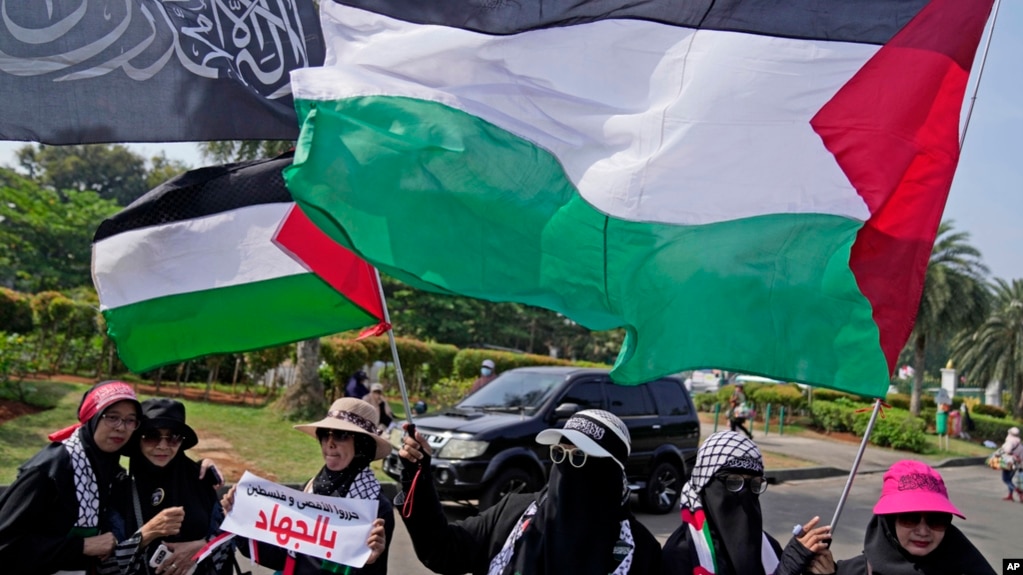
Indonesian Muslim women wave Palestinian flags during a rally in support of Palestinians, in Jakarta, Indonesia, Oct. 13, 2023.
by Umair Sherani 22 October 2023
Since 7th October 2023, the ongoing conflict between Israel and Hamas has been a subject of intense media coverage, with traditional media and social media platforms playing a critical role in shaping public opinion. However, the abundance of information available on social media has created ample opportunities for disinformation pushers, conspiracy theorists, and propaganda artists to spread false narratives and misinformation about the conflict. The social media watchdog group Center for Countering Digital Hate has tracked a spike in efforts to pollute the information ecosystem surrounding the conflict, and founder Imran Ahmed warns that “getting information from social media is likely to lead to you being severely disinformed”. Social media companies have been criticized for their inability to identify violent content and remove it before it reaches thousands or millions of people.
The flood of misinformation on social media has made it difficult to assess what is real, and activists in the region warn that viral horror stories that turn out not to be true may lead people to further distrust authority figures and could spark hate, violence, and retaliation against innocent people. In the case of the Gaza hospital attack, Israel’s government initially tweeted that it had done the strike to hit a Hamas base in the hospital but later retracted the statement and said that Islamic Jihad did it. This shift in narrative highlights the level of hypocrisy that the government keeps showing while committing genocide and war crimes, using chemical weapons such as white phosphorous and other methods like carpet bombing and killing hundreds of thousands of Palestinians. However, the recent attack on the Al-Ahli hospital is no doubt the darkest moment in recorded history of the Palestinian conflict yet.
The media has been used to portray different pictures and shift the world view from actual news on the ground. For example, Israel has ordered to ban Al Jazeera as it has been reporting the actual news and not the narrative Israel wants. The coverage of the recent Hamas attack on Israel and the latter’s criminal bombardment of Gaza has seen an unprecedented amount of disinformation, false content, and violent hate speech on social media platforms. This was especially obvious after the major blunders made by the White house and Israeli government twitter accounts.
Deception as a military technique is not an entirely new notion. In the fifth century BC, Sun Tzu stated that “all war is based on deception.” Classical military history includes the mythological legends of the Trojan Horse, Alexander the Great’s unexpected passage of the Hydaspes River, and Hannibal’s ambush at Lake Trasimene. Subterfuge and deception are important components of modern military tactics, supported by increasingly improved communications technology. But what happens if you are caught in the act?
As this unusual event unfolds, only time will tell how large of a communications blunder/cover-up it will prove to be. However, this identifies one aspect, which is if Israel attacks a civilian target on a false intelligence report that it initially claimed- or that which it refuted to add that intelligence shows it was an Islamic jihad’s missile misfire- this narrative was also largely broadcast by Western media. This whole claim has been refuted by Al-Jazeera by clearly analyzing the footage and pictures from the night of the attack. The takeaway, Israel has had questionable intelligence failures which led to the events of 7th October and the bombing of Al-Ahli Arab Hospital in Gaza, even after controlling most news in and out of Gaza.
Misinformation and changing narratives may certainly escalate tensions and lead to bloodshed. The comments made by President Biden and the Israeli army, which were later denied, serve as outstanding instances in the context of the Israel-Gaza conflict. In a variety of ways, misinformation may inspire hatred and violence. For starters, it may instill fear and anger in the people. When people are exposed to inaccurate information portraying a certain group as a threat, they may acquire unfavorable attitudes toward that group, which can lead to violence.
Second, disinformation may dehumanize the other party, making violent acts seem justified. For example, if false news portrays one side as committing horrible atrocities like beheading kids, it can incite rage and a desire for vengeance. Third, shifting narratives can erode faith in official information sources. When leaders or official accounts make comments that are later challenged, confusion and distrust can arise. The distrust can exacerbate conflict since one side may feel the other is disseminating misinformation on purpose.
Finally, disinformation may upset peace and ceasefire attempts. False narratives may divide the public and make compromise more difficult. They can also sway officials’ decisions that rely on public opinion.
However, quality, reliability and accuracy of journalism in conflict zones is extremely important, the press is given protected status as a civilian according to article 79 of AP I under the Geneva Convention – it is also worth noting here that in the recent events that unfolded in Gaza since the Hamas-Israel conflict started on 7th October 2023, 21 journalists have been targeted and killed, reported Committee to Protect Journalists (CJP).
In conclusion, the spread of disinformation and changing narratives may worsen conflict zones dramatically. It emphasizes the significance of truthful reporting and fact-checking in times of crisis. It also emphasizes leaders’ and official accounts’ responsibilities to give trustworthy information. An unbiased examination of independent investigative teams and watchdog organizations proves to be a critical component in the prevention of disinformation and fake news. The Gaza-Israel war has been subject to a lot of misinformation and fake news spread either by Israel and the western media or that has spread through social media has resulted in innocent lives being victimized by terror in Gaza.
